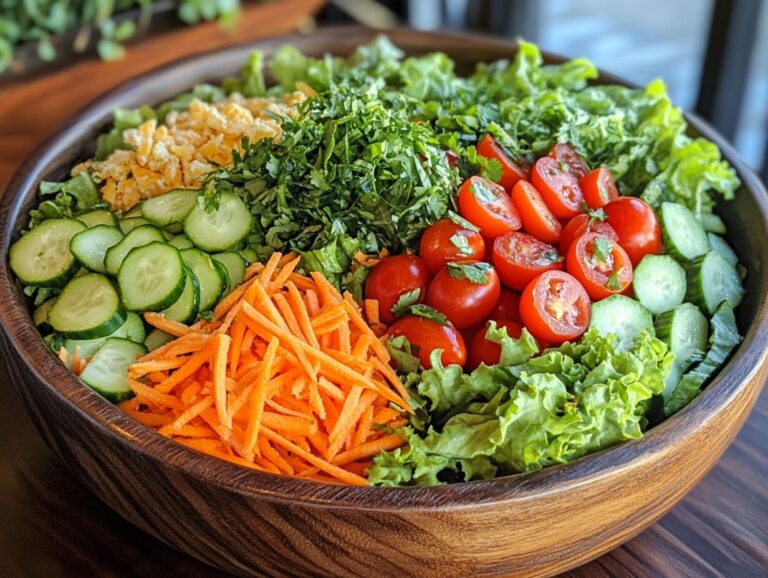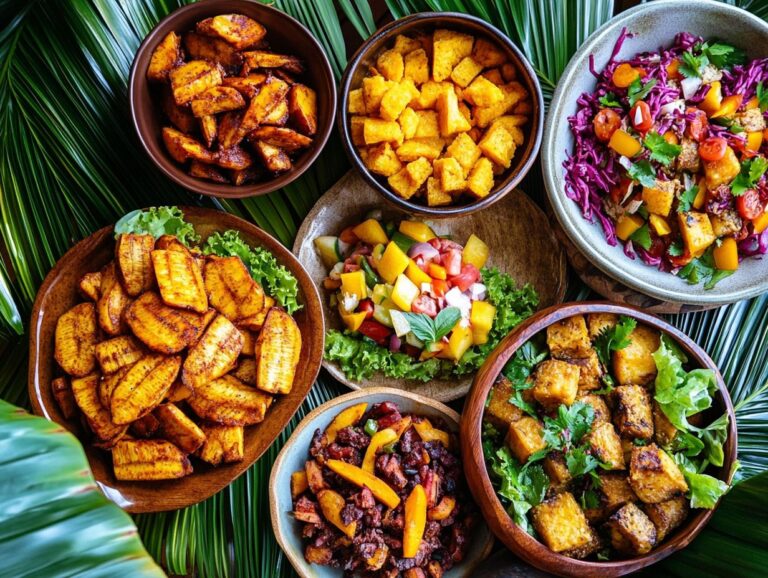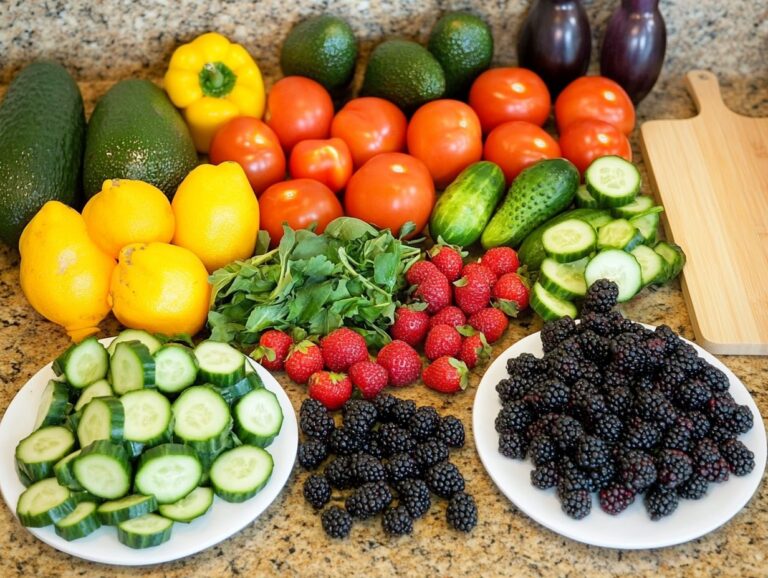In recent years, the connection between diet and health has gained increasing emphasis, particularly concerning the prevention of chronic diseases such as cancer. Adopting a vegan lifestyle not only supports overall health but is also a significant factor in reducing cancer risk. This article explores how a plant-based diet rich in essential nutrients—specifically vitamins, minerals, and antioxidants—can enhance the body’s defense mechanisms. We include delicious and nutritious recipes for all meals, offer meal planning suggestions to ensure balanced nutrition, and highlight superfoods that effectively combat cancer.
Understanding Veganism and Cancer Prevention
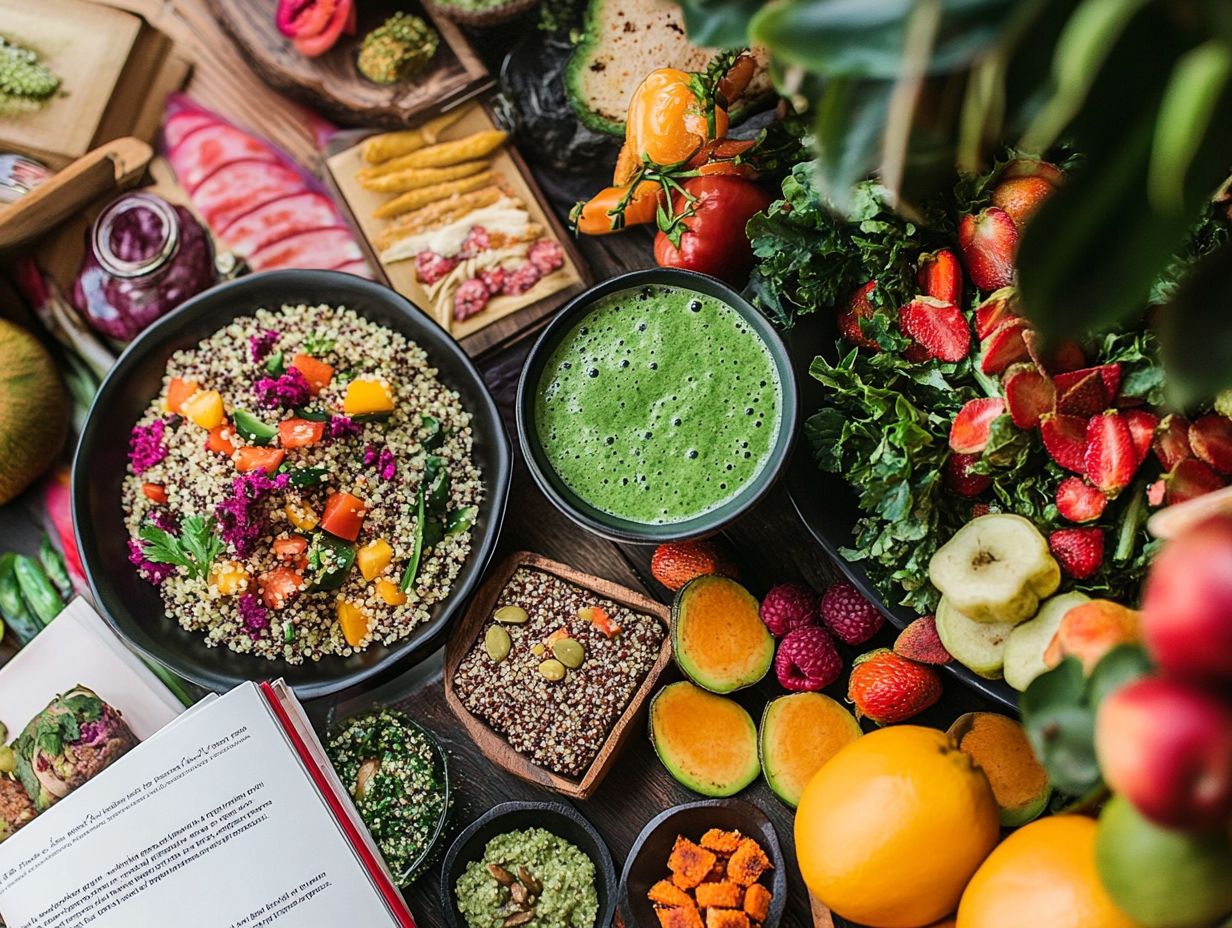
Understanding the connection between veganism and cancer prevention is essential for individuals interested in the benefits of a holistic and healthy lifestyle. Incorporating therapeutic diets such as a vegan cancer diet can significantly aid disease management.
A plant-based diet rich in whole foods, fruits, vegetables, legumes, grains, and superfoods provides key nutrients, antioxidants, and phytochemicals that may help reduce inflammation, boost immune support, and promote optimal wellness.
Research has indicated that incorporating vegan recipes and foods high in dietary fiber and healthy fats can aid in cancer prevention. Therefore, it is crucial for individuals to explore a variety of meals, including gluten-free and raw food options, within this dietary approach.
This comprehensive perspective on nutrition underscores the power of plant-based foods in promoting optimal health, minimizing the risk of disease, and supporting cellular health through personalized nutrition.
How a Plant-Based Diet Can Help Prevent Cancer
A plant-based diet can help prevent cancer by incorporating a wide variety of nutrients from foods such as fruits, vegetables, legumes, nuts, seeds, and whole grains. Nutrients found in these foods, including antioxidants, phytochemicals, and dietary fiber, contribute to boosting the immune system, reducing inflammation, and fighting cancer.
Research has shown that individuals following a plant-based diet tend to consume a broader spectrum of foods, including fermented foods and seasonal produce, which promotes better overall health. The combined benefits of these diverse foods can play a significant role in reducing cancer risk, supporting weight management, and enhancing long-term health.
To maximize these benefits, it is important to focus on food pairings that enhance nutrient absorption and align with dietary guidelines, such as:
- Combining leafy greens with healthy fats like avocado or nuts to aid in the absorption of fat-soluble vitamins.
- Cooking methods; steaming or roasting vegetables preserves their antioxidant properties better than boiling.
- Including a variety of whole grains and legumes increases fiber intake and ensures a complete amino acid profile.
- Choosing low-sugar fruits and incorporating spices like turmeric and garlic can further enhance the cancer-fighting properties of the diet.
In summary, a balanced approach that emphasizes a diverse array of whole foods, healthy fats, minimal added sugars, and nutrient-dense superfoods like quinoa and kale will provide the best foundation for cancer prevention.
Key Nutrients for Cancer Prevention
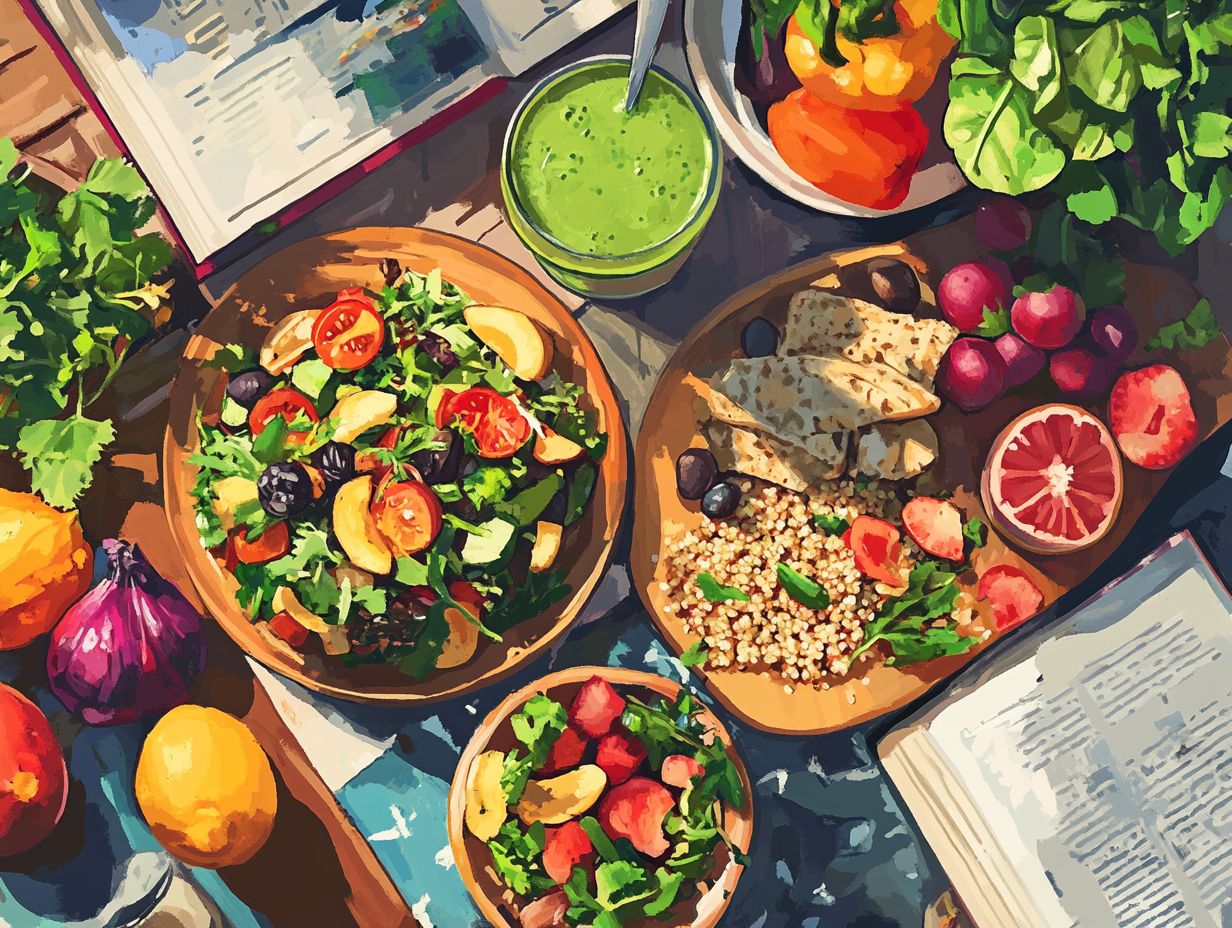
Vitamins, minerals, and antioxidants are essential nutrients for cancer prevention, as they help the body combat cancerous cells, support detox processes, and enhance immune-boosting capabilities.
Dietary fiber from whole foods supports bowel movement, promotes general metabolic health, and aids in managing dietary restrictions. Nutrient-dense foods, such as fruits, vegetables, legumes, nuts, seeds, and tofu, play a vital role in a balanced vegan diet.
These foods provide critical vitamins, minerals, and antioxidants that bolster the immune system, while plant proteins like tempeh contribute to overall wellness and support a sustainable eating approach.
Vitamins, Minerals, and Antioxidants
Vitamins, minerals, and antioxidants are essential components of a plant-based diet that contribute to cancer prevention, overall health, and holistic healing. These nutrients play specific roles in cellular activity, repair, and inflammation reduction.
For instance, Vitamin D is crucial for regulating cell growth and maintaining an alert immune system capable of detecting issues. Selenium is a powerful mineral that helps protect the body against free radicals. Additionally, flavonoids found in various fruits and vegetables have been shown to reduce inflammation and improve communication between cells.
To easily incorporate these nutrients into your daily meals and promote health optimization, consider adding the following:
- Spinach to smoothies
- A handful of mixed nuts as a snack
- Vibrant berries to breakfast oatmeal
Maintaining a balanced intake of these nutrients not only maximizes health benefits but also promotes a sustainable approach to nutrition, strengthens defenses against diseases, including cancer, and supports long-term wellness journey.
Plant-Based Recipes for Optimal Wellness
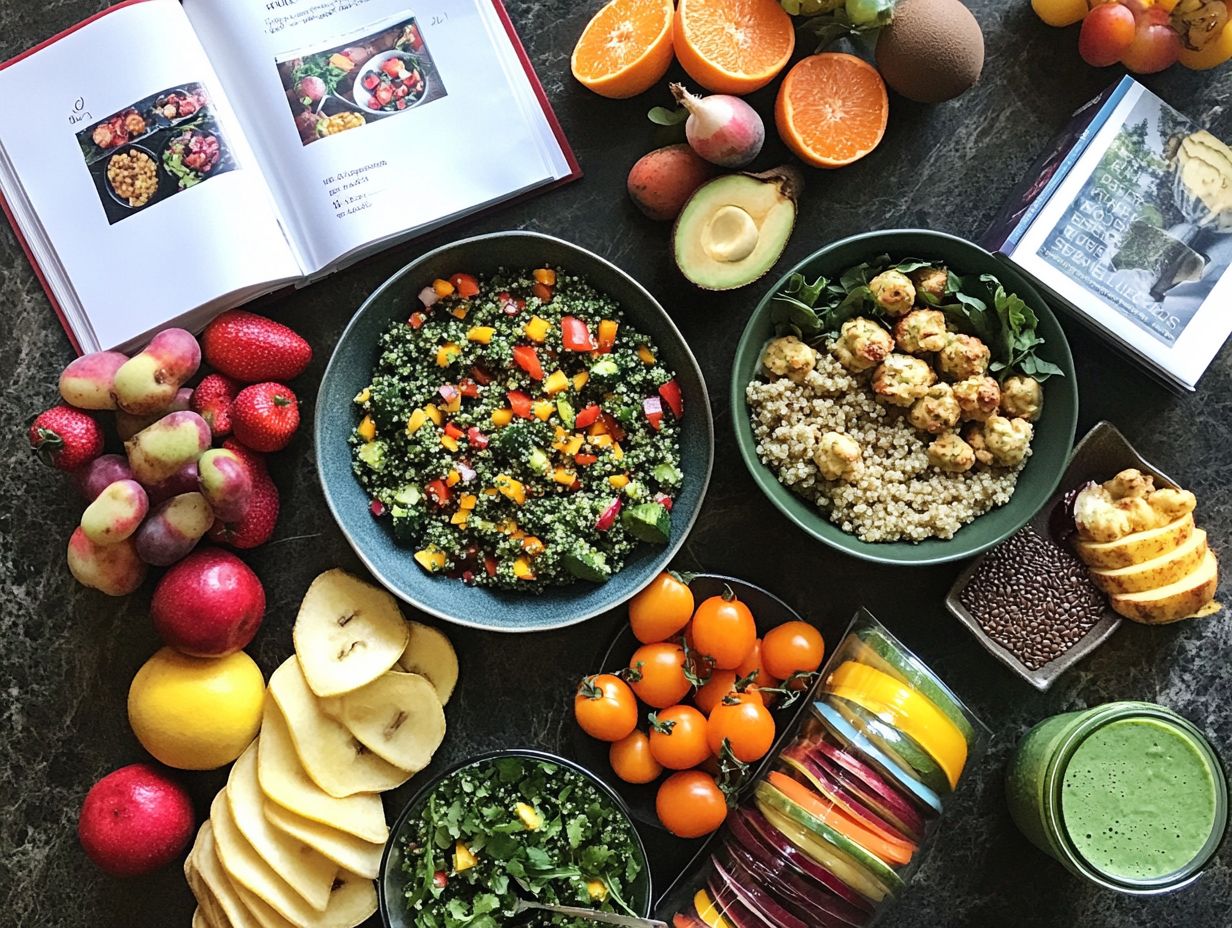
Plant-based recipes are essential for achieving optimal wellness, as they offer a wide array of nutrient-dense options in the form of delicious meals for breakfast, lunch, and dinner, supporting both energy levels and a healthy lifestyle.
From smoothies to soups, salads, and stir-fried dishes, whole foods provide a diverse selection. Superfoods such as quinoa, chia seeds, and kale play a significant role in enhancing the nutritional value of plant-based recipes and contributing to cancer prevention, disease management, and mindful eating.
Engaging in mindful meal preparation encourages individuals to explore various culinary herbs, cooking methods, and food pairings, all of which promote a healthy lifestyle and culinary creativity.
Breakfast, Lunch, and Dinner Options
Incorporating a variety of plant-based meals for breakfast, lunch, and dinner is essential for a balanced and nutrient-dense diet that promotes optimal wellness and healing foods. This approach encourages the consumption of whole foods and seasonal ingredients, enhancing both flavor profiles and nutrient density.
A well-planned plant-based diet can include the following meals, which cater to different dietary restrictions and support immune health:
- For breakfast, consider a nutrient-rich green smoothie made with kale, avocado, lemon juice, and superfood smoothies powders for an abundance of vitamins, healthy fats, and antioxidants.
- For lunch, a colorful grain bowl featuring roasted sweet potatoes, black beans, quinoa, and a lemon-tahini dressing provides a good source of fiber, plant protein, and essential minerals.
- For dinner, enjoy a comforting vegetable soup packed with seasonal vegetables, lentils, and herbs, offering plenty of fiber, antioxidants, and health benefits.
Meal Planning for a Vegan Cancer Diet
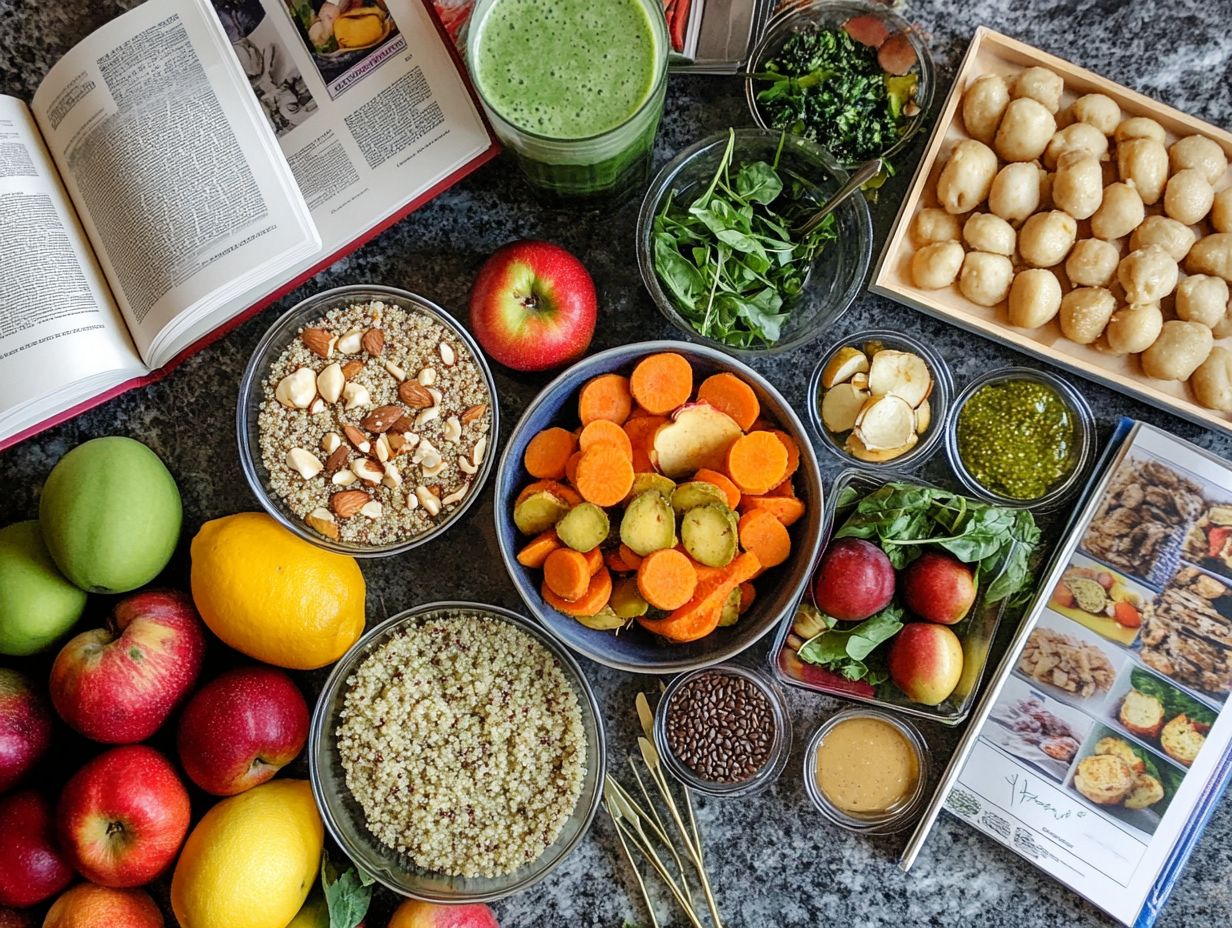
Meal planning is a crucial aspect of a vegan cancer diet, as it helps ensure that individuals receive balanced and adequate meals that adhere to dietary guidelines and support cancer research findings.
By engaging in meal planning, they can incorporate a wide range of essential nutrients while minimizing the risk of unhealthy food choices. This approach is vital not only for cancer prevention but also for promoting a healthy lifestyle through mindful eating practices, sustainable eating habits, and stress reduction.
The various components of meal preparation include organizing ingredients, experimenting with new recipes, making meal substitutions to maintain variety and flavor in the diet, and attending cooking classes. All of these efforts can significantly contribute to a successful wellness journey and holistic healing.
Tips for Creating Balanced and Nutritious Meals
Creating balanced and nutritious meals is essential for anyone following a vegan diet aimed at cancer prevention, as it directly impacts overall health, therapeutic diets, and well-being.
Incorporating a wide variety of food groups, such as legumes, grains, nuts, seeds, fruits, and vegetables, ensures an ample intake of essential vitamins, minerals, antioxidants, and proteins.
Experimenting with different cooking methods—such as steaming, grilling, or sautéing vegetables—can add variety to meals while preserving nutrients and enhancing flavors, promoting culinary creativity.
For instance, pairing foods like spinach with citrus can significantly boost iron absorption and nutrient absorption, which is vital for energy and immune function.
Prioritizing whole, unprocessed foods and adhering to dietary guidelines helps establish a structured meal plan, making it easier to achieve nutrient diversity and support health optimization.
Additionally, using herbs and spices not only adds flavor and flavor enhancers but also provides health benefits, making it more enjoyable to eat nutritious meals and support holistic healing.
With careful planning, anyone can prepare meals that are both delicious and nutritionally sound, contributing to a proactive approach to cancer prevention and supporting a vibrant lifestyle.
Incorporating Superfoods into Your Vegan Diet
Superfoods are among the best foods for cancer prevention and treatment, and they can significantly enhance your nutrition as part of a vegan diet. These nutrient-rich foods offer a variety of health benefits, support immune-boosting, and promote metabolic health.
Examples of superfoods include:
- Kale
- Quinoa
- Chia seeds
- Berries, such as blueberries and strawberries
All of which are packed with vitamins, minerals, antioxidants, and phytochemicals and are renowned for their cancer-fighting properties. Incorporating superfoods into your meals allows for the creation of diverse recipes while boosting their health potential. From smoothies to salads and soups, there are countless recipes that illustrate how a plant-based diet can improve overall health, enhance immune support, and contribute to cancer prevention.
Powerful Ingredients for Cancer Prevention
Vegan foods linked to cancer prevention are among the most powerful components of a successful vegan diet, as they provide significant health benefits, support immune health, and contribute to optimal wellness when consumed regularly.
Incorporating these foods into daily recipes and meal planning can dramatically enhance both the taste and nutritional value of an individual’s diet, supporting holistic healing and balanced meals.
For instance, cruciferous vegetables like broccoli and kale are rich in glucosinolates, substances that studies suggest may aid in detoxification, support cellular health, and provide anti-inflammatory benefits.
Berries, particularly blueberries and strawberries, are high in antioxidants such as anthocyanins, which have been shown to inhibit the growth of cancer cells and support the microbiome.
Additionally, legumes such as lentils and chickpeas are abundant in fiber, protein, and plant-based nutrients, promoting gut health and potentially reducing cancer risk.
Practical culinary applications, such as colorful salads featuring these ingredients or superfood smoothie bowls to kickstart the day, not only make meals more enjoyable but also help strengthen the body’s natural defenses against disease, support stress reduction, and enhance overall wellness.


